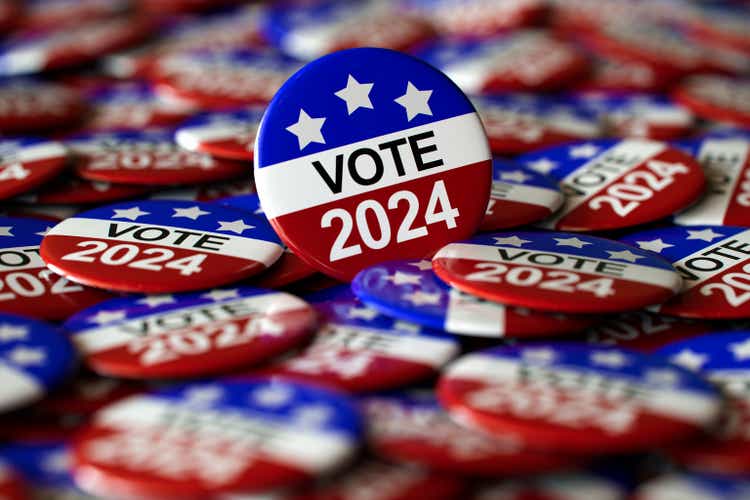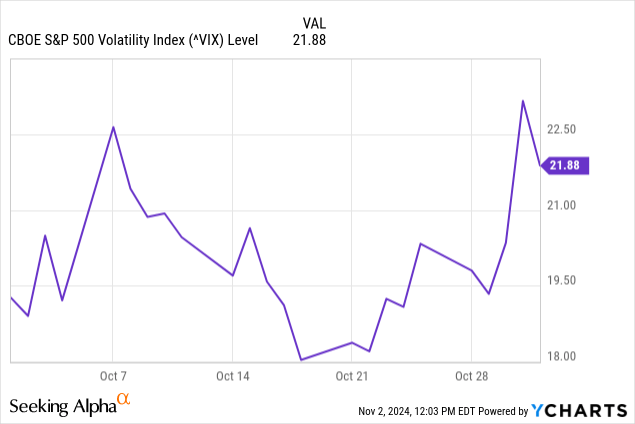SP500: The Election Playbook - Odds Shifting In Harris Favor
- The S&P500 is facing the risk of a contested election, as the odds of Harris' victory increase.
- The resulting liquidity shock could cause a deep drawdown, but also a V-shaped recovery assuming the event does not trigger a recession.
- However, the likely post-election geopolitical escalation could cause a stagflationary shock like in 1974.

mphillips007
Odds changed in favor of Harris victory
I discussed the election 2024 playbook on October 26, but there have been some major changes, and the playbook needs to be updated and fine-tuned, with the additional focus on the post-election period.
The major update is that the odds of who will become the next President have changed significantly. On October 26th, the PredictIt odds were heavily in favor of Trump with 59 cents, while Harris was at only 46 cents.
The odds have since significantly changed, now Harris has slightly higher chance of winning with 52 cents, versus Trump 51 cents.

PredictIt
The PredictIt odds now match the polls, which show that the race is virtually even in the swing states, and Harris leading by 48% to 46.8% in the national polls. So, three days before the election - the race is a toss-up.
However, the momentum has shifted in Harris' favor, and the question is whether that momentum can continue over the next few days and tilt the election in her favor.
It seems like the odds started changing after the Trump's Madison Square Garden rally, specifically due to the negative comments about Puerto Rico, and also due to concerns about the women vote.
Thus, given the proximity of the election, it will be difficult for the Trump campaign to regain the momentum, or to stop the Harris momentum. Thus, in my opinion, Harris now has a slightly higher probability of winning, which would be a very narrow victory.
The Republicans were favored to win the control of the Senate, but even the Senate is now a toss-up. The Democrats were favored to gain the control of the House, but this is also now a toss-up. Thus, the control for the Congress is a toss-up, and the question is whether the Harris momentum could spill over into the congressional election as well.

FiveThirtyEight
Why is this important?
The major risk with the US election is the possibility of the contested election turning into domestic instability, where the "loser" does not close the process with the concession speech, and there is no peaceful transition of power on January 20th.
Based on the events in 2020, this scenario plays out only if Harris narrowly wins. Reuters reports that Trump's fraud claims stir the concerns of another contested election given the comments in Pennsylvania that "he only envisions losing if election is corrupt".
Thus, given the current election odds, the probability of this worst-case scenario has significantly increased.
As I previously stated, the best-case scenario for the stock market would be the Trump victory with a deadlock in Congress. In this situation, there would be a peaceful transition of power, yet, some deficit increasing policies would likely not be able to pass the Congress.
The second-best scenario for the stock market would be the Trump victory with the red sweep on the Congress, but this would likely cause the interest rates to spike and cause a correction in the stock market after the initial rally.
Any situation with Harris victory is not good for the stock market, given the possibility of contested election, but Harris victory with the blue sweep in the Congress would likely be the worst scenario, specifically given the tax policy.
At the point, the stock market is facing the Harris victory, and if the momentum carries into the congressional election, also the blue sweep.
The liquidity shock event
The US election is a potential liquidity shock event. If there are indications that Harris is leading on the election night on November 5th, and the rhetoric from the Trump administration turns negative with respect to the fraud allegations, the dealers will start withdrawing the bid in the futures markets fearing the political instability.
This could cause a significant drawdown in the stock market on the election night, possibly down to the 10% circuit breaker.
The best indication of this scenario is the VIX index. Currently the VIX is just below 22 - and this is high. The VIX over 20 suggests that the market participants are increasingly worried about the liquidity shock, and, thus, are buying the options to hedge, which is pushing the option prices higher, and the VIX level higher.
Investors should pay close attention to the VIX futures on the election night. The VIX could spike similarly to the Covid shock levels, or earlier in August yen-carry trade levels, on par with the Lehman Brother's 2009 levels.
On the other hand, if the VIX starts falling, and breaches the 20 level, it is likely that the stock market would spike as uncertainty is reduced - and this is the Trump victory scenario. In addition, a very decisive blow-out Harris victory would also cause the VIX to collapse, as it would be more difficult for Trump to challenge the blow-out Harris victory, but the probability of this scenario is very low.
Other potential shocks to consider
Regardless who wins the election, there are other potential shocks to consider during the post-election period:
- The geopolitical situation in the Middle East is likely to escalate right after the election. As an update, Iran is now indicating that it will retaliate against Israel, which increases the probability of the energy price shock if Israel strikes Iran's energy infrastructure.
- The Fed is likely to turn more hawkish at the November meeting a few days after the election. The core PCE for September came at 0.3%, and that's not consistent with the 2% inflation target. The initial jobless claims are back to the low levels after the hurricane-related spike, which suggests that the labor market is tight.
Implications
The S&P500 (SP500) has been rising during the month of October, anticipating the Trump victory, based on the prediction odds. Now those predictions odds are turning in Harris favor, which is increasing the probability of the deep drawdown on the election night. Given the that the S&P500 is trading at the PE ratio of near 25, the level of complacency is very high, which increases the possibility of a very deep correction.
In addition, the election liquidity shock is followed by a possible geopolitical escalation shock right after the election, and a possible Fed shock.
Note, the risk now is the liquidity shock. This implies a very deep correction, but also a very sharp V-shaped recovery once the uncertainty is removed (eventually) - assuming the forthcoming events don't trigger the recession. The problem is that the geopolitical energy shock could trigger stagflation like in 1974. Given that the S&P500 is still near the all-time highs, it's prudent to reduce exposure to equities.
 Data by YCharts
Data by YCharts
Disclaimer: Investing carries risk. This is not financial advice. The above content should not be regarded as an offer, recommendation, or solicitation on acquiring or disposing of any financial products, any associated discussions, comments, or posts by author or other users should not be considered as such either. It is solely for general information purpose only, which does not consider your own investment objectives, financial situations or needs. TTM assumes no responsibility or warranty for the accuracy and completeness of the information, investors should do their own research and may seek professional advice before investing.

